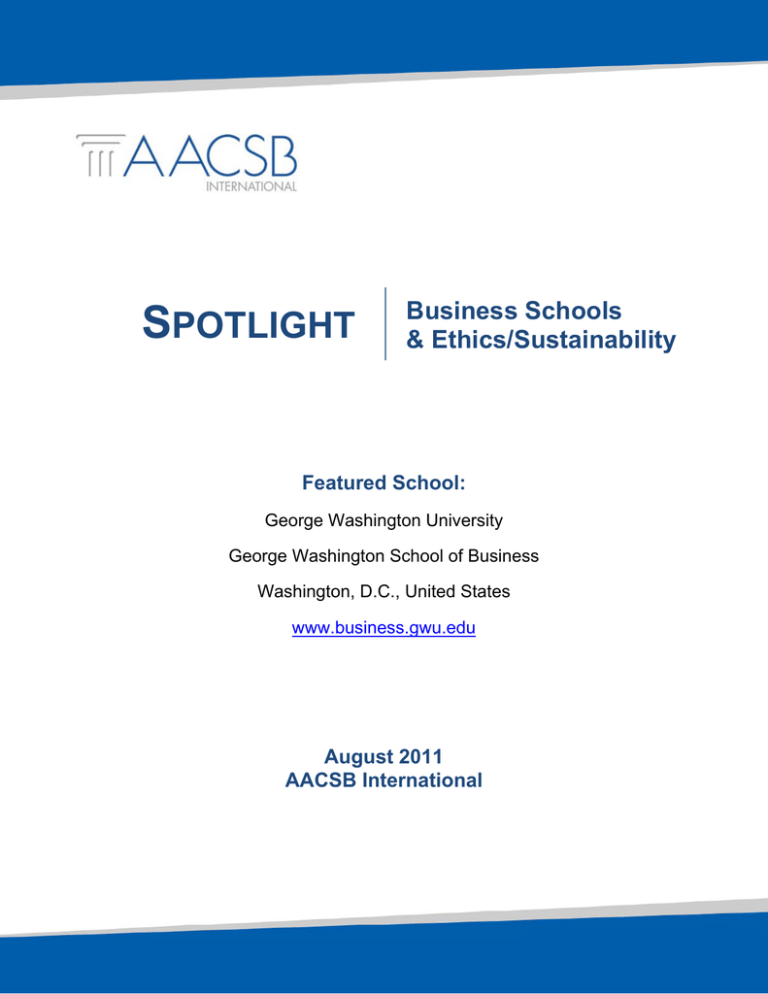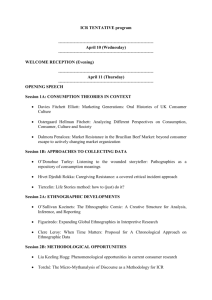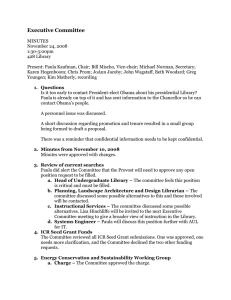
SPOTLIGHT
Business Schools
& Ethics/Sustainability
Featured School:
George Washington University
George Washington School of Business
Washington, D.C., United States
www.business.gwu.edu
August 2011
AACSB International
SPOTLIGHT | Business Schools & Ethics/Sustainability
George Washington University | 2
The Institute for Corporate Responsibility
The faculty of the School of Business at George Washington University (GWU) have long been
proponents of a robust ethics component to their program curricula. Dr. Doug Guthrie, dean of the
George Washington School of Business (GWSB) for the past year, says that his predecessor Susan
Phillips took a strong lead on this issue, and that he intends to see that ethics and corporate social
responsibility continue to be strengths of the curricula at the GWSB. One of the primary vehicles available
at the school to aid in this endeavor is the Institute for Corporate Responsibility (ICR).
The idea for the ICR grew out of a 2004 gift to the GWSB from A. James Clark, chairman of Clark
Enterprises, to establish the Lindner-Gambal Professorship in Business Ethics in honor of two GWSB
alumni, Colonial Parking co-founder Sergius Gambal and his longtime business partner Thaddeus
Lindner. Then-Dean Phillips indicated at the time that filling this professorship could help provide the
impetus for launching “a research center focused on business and ethics.”1
According to Dean Guthrie, the recruitment of Dr. Timothy Fort to fill the position did just that, and in
October 2006, the Institute for Corporate Responsibility officially received its charter from the university.2
Dr. Fort is now the executive director of the ICR, and heads its Business and Peace Program, one of the
four primary research areas at the Institute. The others include Environmental Sustainability, Corporate
Governance, and Global Stakeholder Strategies.3
The purpose of the ICR is threefold. As a research institute of the GWSB, it is focused on the
development and dissemination of intellectual contributions to the field of ethical leadership, responsible
management and sustainable business practices. In addition, the Institute has a strong focus on outreach
at local, national, and international levels. Aided by the prominence of its location in Washington, D.C.,
the ICR is able to reach out and form linkages between the academic, business, government, and NGO
sectors to enhance both the scope and impact of its research output. Finally, the Institute has been
instrumental in the GWSB’s ongoing quest to ensure that content pertaining to ethics and corporate
responsibility is integrated throughout its program curricula.
Knowledge Creation
The ICR has successfully attracted a strong base of faculty in the fields of ethics and corporate social
responsibility (CSR). Including Dr. Fort and the heads of the other three program areas, 15 GWU faculty
are currently associated with the Institute. Most are from the GWSB, but other academic units at the
university are also represented, including the Elliott School of International Affairs, the Trachtenberg
School of Public Administration and Public Policy, the School of Engineering and Applied Science, and
the Departments of Economics and Philosophy.4 Faculty associate with the ICR based on self-selection
and research interests.
© AACSB International. All Rights Reserved.
SPOTLIGHT | Business Schools & Ethics/Sustainability
George Washington University | 3
In addition to faculty, doctoral students interested in ethics and CSR are heavily involved in the ICR,
according to Dr. Fort. He notes that the faculty of the Institute “work with doctoral students a great
deal. We involve them in all the areas... helping with faculty research, sponsoring their own research,
having them as researchers for our partnerships with the other sectors, giving them the opportunity to
present at conferences, many of which turn into special issues, academic papers, or books. It's a great
opportunity for them and it is a great resource for us as well.”5
The research output of the ICR is indeed prodigious. Various books, papers, journal articles, and other
intellectual contributions of the faculty and doctoral students associated with the Institute have made a
demonstrable impact on the field of business ethics and sustainability. For example, the U.S.
Environmental Protection Agency selected a paper by Dr. Jorge Rivera, an assistant professor of
strategic management and public policy associated with the ICR, as one of the top ten examples of
excellent research available on compliance and environmental behavior literature in 2007.6 As a result of
such research, the support of the Institute’s research activities has grown more varied. Dean Guthrie says
that in the early days, approximately two thirds of the ICR’s funding came from the GWSB Dean’s Office
and one third from the university’s Vice President for Research. Now, however, enough of the Institute’s
research is funded by external grants from corporations and other entities that only one third comes from
the GWSB.7
The point of the ICR, however, is not simply to perform and disseminate research on corporate social
responsibility and related issues, Dr. Fort maintains. While he acknowledges that the ICR is a research
institute at its core, he notes that “being in Washington, that takes on a particular meaning. GW's Dean of
the Elliott School of International Affairs likes to make the analogy that schools around the country do a
great job building bridges between their schools and public policy impact, but at GW, we don't build ANY
bridges. Instead, we use the sidewalk.”8
Location and Outreach
The ICR faculty work tirelessly to create synergies between academe and business leaders, policy
makers, NGOs and other third sector organizations, says Dean Guthrie, and the results are nothing short
of vital to the impact of the Institute and its work. Dr. Fort, himself well known in government circles, says
that one of the greatest advantages of the Institute’s location is being in close proximity to so many
organizational headquarters upon which the faculty of the ICR can draw for knowledge, such as the
Center for International Private Enterprise, the World Bank, various U.S. government agencies, etc. It
also gives the GWSB and the Institute the ability to attract participants from various sectors for
© AACSB International. All Rights Reserved.
SPOTLIGHT | Business Schools & Ethics/Sustainability
George Washington University | 4
workshops, conferences, and other events more easily. “[E]veryone is willing to come to Washington for
an event,” notes Dr. Fort. “It has terrific convening power.”9
He further says of the ICR, “[W]e like to take advantage of that to host events, not just to disseminate
information, but to bring together people from all sectors - business, government, NGO, academia - to
look at issues. Inevitably new insights arise out of this. Obviously, this means that creating academicbusiness-government-NGO partnerships is important to our work.”10 He cites as a prime example of
cross-sector partnership creation the Task Force on Business and Peace that the ICR co-convenes with
the Center for Sustainable Economies at the U.S. Institute of Peace.11
Since its beginning in the summer of 2010, the Task Force has been charged to develop clear and
effective strategies that align business activity in fragile/conflict-affected regions with sustained efforts to
promote lasting peace.12 The Task Force has conducted a number of activities in pursuit of that goal,
including a three-session eSeminar on Business and Peace in March 2011, which was attended online by
over 1,500 people from 93 countries around the world.13 Discussions ranged from understanding the
nexus of business and peace-building, to how to leverage the power of business to come up with
innovative solutions to the challenges presented by conflict-affected areas.
“Our Task Force has retired four star generals, former CEOs of major companies, academic leaders, and
NGO leaders as members,” Dr. Fort says. “And just that mix of people - most of whom have not been in a
room with all these different kinds of people - produces a rare dynamic and new insights. That’s core to
research and it's hard to replicate anywhere other than a place like Washington.”14
Creating a Robust Ethics & Sustainability Curriculum
The ICR and its work have also been instrumental in promoting the development of ethics and CSR
content for the programs at the GWSB. Dean Guthrie says that the school underwent a period of major
curricular reform in 2008, surrounding the development and launch of GWSB’s full-time Global MBA
program. The program includes a first-term core course developed by Dr. Fort and his colleague Dr. Mark
Starik, head of the Environmental Sustainability research program at the ICR, and taught by Dr. Fort.15
The content of the course, entitled Business Responsibility and Sustainability, includes the research of
both professors and specifically incorporates the ICR’s mission of developing and disseminating
scholarship pertaining to corporate responsibility. The objectives of the course include learning and
understanding the various perspectives necessary to ethical decision-making, and applying the skills
required to address issues of business sustainability.16 Dr. Fort sees particular success in one unique
means by which this is accomplished in this, and in the other core courses in the MBA curriculum as well.
© AACSB International. All Rights Reserved.
SPOTLIGHT | Business Schools & Ethics/Sustainability
George Washington University | 5
He works with the faculty who teach the core courses to create ethics video commentaries on cases or
issues selected by those faculty. “By having ethics videos in all the classes,” says Dr. Fort, “we keep the
issue of ethics alive in every course and tie decision-making on ethics back to the open-module so
students have a consistent message of how to approach ethics issues, no matter where those issues
arise.”17
In addition to the required course content, the ICR has developed other ways by which GWSB MBA
students can gain further experience with ethics and sustainability-related activities. In concert with the
U.S. State Department’s Economic Empowerment in Strategic Regions (EESR) Program, the Institute has
created the Business Development in Conflict Zones Program. In this program, MBA students gain the
opportunity to work with ICR faculty and individual entrepreneurs from conflict-affected nations, helping
them develop their business ideas in such a way as to aid in the economic recovery of such regions,
while meeting global standards of excellent business practices and social responsibility.18
The Institute has also incubated a certificate program in responsible management to be offered in tandem
with the GWSB’s MBA programs, based on the UN Global Compact’s six Principles for Responsible
Management Education (PRME).19 Requirements for earning the PRME Certificate in Responsible
Management include participation in a group blog about contemporary issues of corporate responsibility,
community service and service learning volunteer hours outside the classroom, a five-page reflective
essay, and six elective credit hours of coursework in the areas of business ethics and CSR, all of which
are overseen by a faculty member. There is no set list of electives that may be chosen, so long as the
student is able to pick out and blog about the relevant concepts.20 Dr. Fort says that though the program
is young yet, he expects that “this year… roughly 10% of second year students will pursue this and
probably that many, maybe a few more, of first year students will do so.”21
Acknowledgements: AACSB International is grateful for the assistance of Dr. Doug Guthrie, Dean of the
George Washington School of Business, and Dr. Timothy Fort, Lindner-Gambal Professor of Business
Ethics and Executive Director of the Institute for Corporate Responsibility.
© AACSB International. All Rights Reserved.
SPOTLIGHT | Business Schools & Ethics/Sustainability
George Washington University | 6
End Notes
1
Milke, Heather O. (2004) “Not Business As Usual,” GW Magazine, Fall 2004. Electronic document, http://www.gwu.edu/~magazine/archive/2004_fall/docs/feature_business.html, accessed July 29, 2011. 2
George Washington School of Business. (2011) Institute for Corporate Responsibility web page. Electronic document, http://business.gwu.edu/icr/, accessed July 28, 2011. 3
George Washington School of Business. (2011) Institute for Corporate Responsibility, Primary Program Areas web page. Electronic document, http://business.gwu.edu/icr/programs/, accessed July 28, 2011. 4
George Washington School of Business. (2011) Institute for Corporate Responsibility, Faculty web page. Electronic document, http://business.gwu.edu/icr/people/faculty/, accessed July 28, 2011. 5
Fort, Timothy. (2011) Personal communication, July 28, 2011. 6
George Washington School of Business. (2011) Institute for Corporate Responsibility, Publications web page. Electronic document, http://business.gwu.edu/icr/research/publications/index.cfm, accessed August 5, 2011. 7
George Washington School of Business. (2011) Institute for Corporate Responsibility, Research Grants web page. Electronic document, http://business.gwu.edu/icr/research/grants/, accessed August 5, 2011. 8
Fort, Timothy. (2011) Personal communication, July 28, 2011. 9
Fort, Timothy. (2011) Personal communication, July 28, 2011. 10
Fort, Timothy. (2011) Personal communication, July 28, 2011. 11
U.S. Institute of Peace. (2011) Business and Peace Taskforce web page. Electronic document, http://www.usip.org/programs/initiatives/business‐and‐peace‐taskforce, accessed August 5, 2011. 12
U.S. Institute of Peace. (2011) International Network on Economics and Conflict, eSeminar on Business and Peace web page. Electronic document, http://inec.usip.org/event/2011/feb/23/eseminar‐business‐and‐peace, accessed August 5, 2011. 13
Gilpin, Raymond, Timothy Fort, and John Forrer. (2011) Update on Business and Peace Initiative, April 2011. Electronic document, http://www.usip.org/files/Amanda%20Mayoral/B&P/00099448.PDF, accessed July 29, 2011, P.2. 14
Fort, Timothy. (2011) Personal communication, July 28, 2011. 15
George Washington School of Business. (2011) Global MBA, Academic Program web page. Electronic document, http://business.gwu.edu/gmba/academic/, accessed August 1, 2011. 16
George Washington School of Business. (2011) Business Responsibility and Sustainability Course Syllabus. Electronic document, http://business.gwu.edu/smpp/syllabi/fort_mbad_281_fall08.pdf, accessed August 5, 2011, P. 8‐9. 17
Fort, Timothy. (2011) Personal communication, August 8, 2011. 18
George Washington School of Business. (2011) Institute for Corporate Responsibility, ICR & EESR (State Department) Program web page. Electronic document, http://business.gwu.edu/icr/projects/eesr/, accessed August 5, 2011. 19
George Washington School of Business. (2011) Institute for Corporate Responsibility, Certificate in Responsible Management web page. Electronic document, http://business.gwu.edu/icr/projects/certificate‐responsible‐
management/, accessed August 1, 2011. 20
George Washington School of Business. (2011) Institute for Corporate Responsibility, Certificate in Responsible Management web page. Electronic document, http://business.gwu.edu/icr/projects/certificate‐responsible‐
management/, accessed August 1, 2011. 21
Fort, Timothy. (2011) Personal communication, July 28, 2011. © AACSB International. All Rights Reserved.




